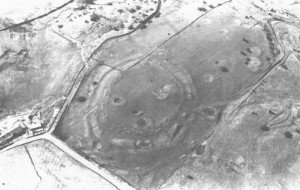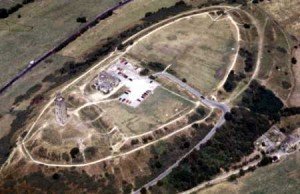This denuded hillfort is oval and encloses almost two acres. The defences comprise triple circuits of bank and ditch, with scarps representing outworks to the NE. The innermost bank is the slightest and may represent an earlier, univallate fort.
Category: Vitrified Fort
Arka Unskel Fort
Arka Unskel is 2½ miles ESE of Arisaig at NM693839 and has also been known as Ard Ghaunsgoik and Ard Ghamhgail. Described as on a promontory on the north side of Loch nan Uamh with a heavily vitrified wall.
Castle Hill, Almondbury
Underneath these medieval earthworks is a series of earlier defenses which dates back to the early Iron Age. This was the building which burned down and it is regarded as one of Yorkshire’s most important early Iron Age hill forts, it is one of Yorkshires true multi-valet hill forts and gives the impression of a tribal capital of a significant region, given the lack of similar hill forts in the region.
Sep 27
Finavon, Angus
Finavon, Angus . Finavon Hill has attracted a great deal of archaeological interest from antiquarians and archaeologists over the years especially since it displayed traces of vitrified rock. It was planned 100 years ago by David Christison and was subject to extensive excavations undertaken by Prof. Gordon Childe between 1933-5. That the fort had been …
Sep 27
Vitrified Forts Distribution
Georgraphic Distribution One of the great mysteries of classical archaeology is the spartan worldwide distribution of vitrified forts with the exception of Scotland.. Scotland There are at least 50 such forts throughout Scotland. Among the most well-known are Dunnideer, Craig Phadraig (near Inverness), Abernathy (near Perth), Dun Lagaidh (in Ross), Cromarty, Arka-Unskel, Eilean na Goar, …
Sep 27
Why Vitrify a Fort?
Why was it done and by whom? Practical reasons? Originally it was thought that the forts had become vitrified due to an enemy attack. A theory proposed by Childe in the 1930 thought it was that it was invaders, not the builders, who were assaulting the forts and then setting fire to the walls with …
Sep 27
How to Vitrify a Fort
Vitrification of Hill Forts The Vitrification process Vitrification as seen in hillforts is where the surface of the rampart has been heated to temperature that the stone has melted and bonded with its neighboring stone. In some cases forming a glassy surface. The theoretical and limited practical attempts to recreate vitrification have largely been inconclusive, …
Sep 27
Classification of Vitrified Forts
Exploration of vitrified fort classification Currently, there is a single grouping of vitrified forts, it is our contention that in reality only a few forts should be classified as such, and that analysis would be helped if this classification was further refined. In order to perform better asnalysis of vitrified forts, it will be neccesary …
Sep 27
L’enigme des forts vitrifies
Mémo : RC-Forts vitrifiés (mise à jour mai 2001). L’énigme des forts vitrifiés C’est lors d’un voyage en Ecosse, au cours de l’été 1997, que nous avons entendu parler pour la première fois de forts vitrifiés. C’était au château d’Urqhart, au sud d’Inverness. Les monuments historiques fermant tôt, dans ce pays, nous ne pûmes voir …






